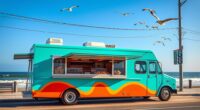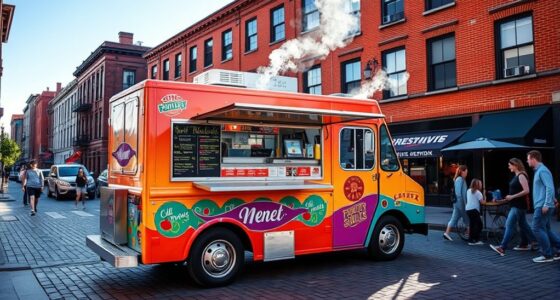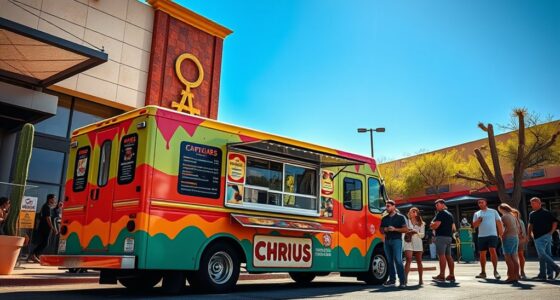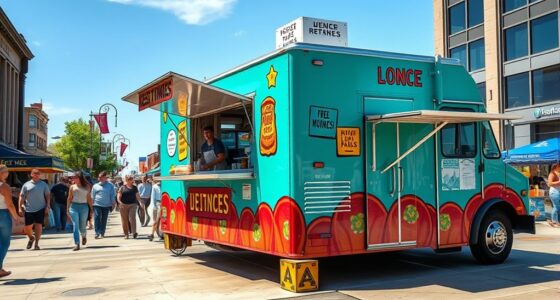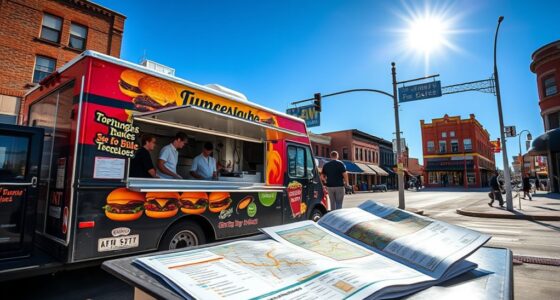To open a food truck in Orlando, you’ll need several permits, including a Florida DBPR license and a food service permit from FDACS, with costs ranging from $50 to $350. Plan for startup expenses of $70,000 to $125,000, covering truck, equipment, and permits. You’ll need to find compliant locations that match zoning rules, craft a safe menu, and develop marketing strategies targeting local events and social media. Continue exploring to learn detailed steps to start smoothly.
Key Takeaways
- Obtain necessary permits including MFDV license, food permits, and Business Tax Receipt before operating in Orlando.
- Startup costs range from $70,000 to $125,000, covering vehicle, equipment, permits, and initial inventory.
- Allowed locations include private properties, malls, and town centers; avoid prohibited zones like Downtown Orlando.
- Ensure menu compliance with Orlando regulations by focusing on prepackaged or fully cooked foods, and securing proper safety permits.
- Market effectively to Millennials and Gen Z through branding, community events, social media, and strategic partnerships.
Navigating Permits and Licenses in Orlando
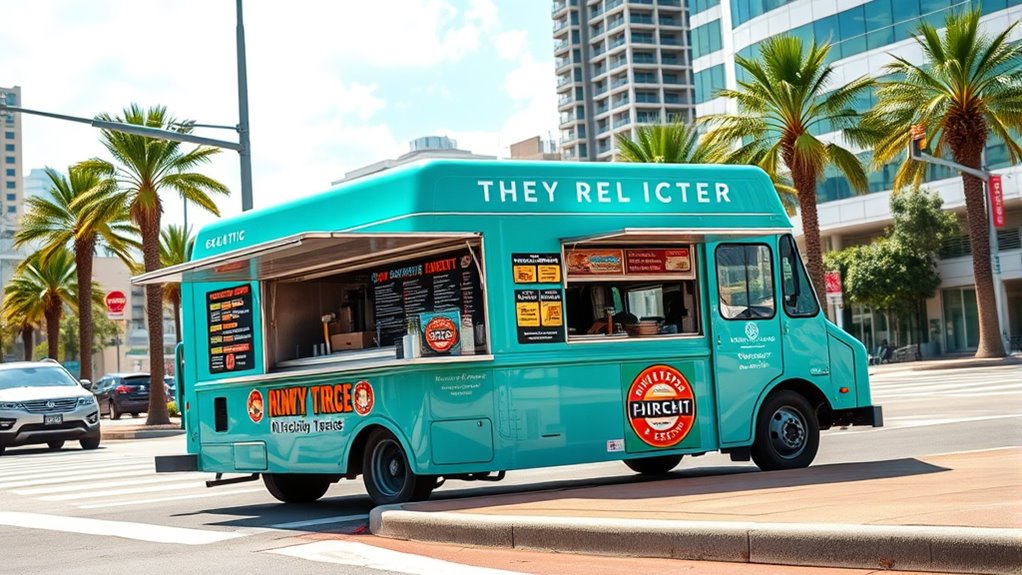
Are you ready to hit the streets with your food truck in Orlando? First, you’ll need to obtain a Mobile Food Dispensing Vehicle (MFDV) license from the Florida Department of Business and Professional Regulation (DBPR). The process involves submitting a commissary agreement, floor plan, and proof of equipment, water, and fire safety. If you plan to serve raw or prepackaged foods, you’ll also need a food permit from the Florida Department of Agriculture and Consumer Services (FDACS), costing between $50 and $350. Don’t forget to register for sales tax with the Florida Department of Revenue. In Orlando, you’ll need a Business Tax Receipt, comply with zoning rules, and get approval from a licensed commissary kitchen. Vehicle registration, health permits, and fire safety inspections are also mandatory to operate legally. All state licenses must be obtained before street operations begin, ensuring full compliance with local and state regulations. Additionally, understanding food safety compliance is essential to maintain high standards and prevent violations during your operations.
Estimating Startup and Operating Expenses
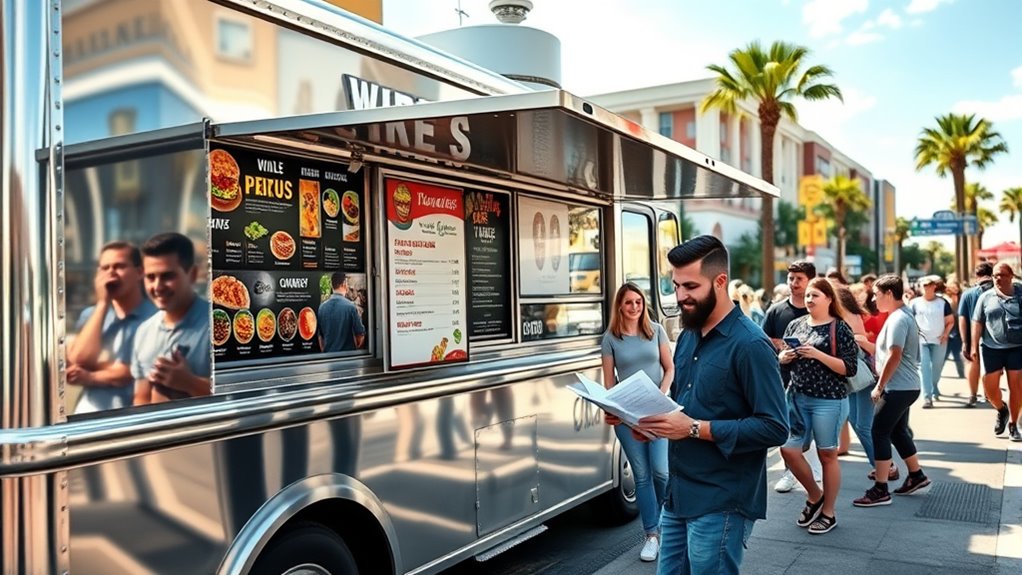
Estimating startup and operating expenses is essential for turning your food truck idea into a sustainable business. Your initial costs will likely range from $70,000 to $125,000, covering vehicle, equipment, and permits. A new truck can cost between $40,000 and $150,000, while used trucks reduce upfront costs but may lead to higher repair expenses. Kitchen equipment adds another $10,000 to $15,000, and branding, including vehicle wraps, can cost $2,000 to $5,000+. Licensing and permits vary from $1,800 to $28,000, depending on location and requirements. Initial inventory for food and supplies typically runs $2,000 to $3,000. Proper planning and cost analysis are crucial to ensure your food truck business remains profitable and sustainable in a competitive market. Additionally, understanding local regulations and zoning laws can prevent costly legal issues and delays. Monthly operating costs like fuel, permits, and inventory will add to your expenses, so thorough budgeting is vital for success.
Finding Permissible Locations and Understanding Zoning Rules
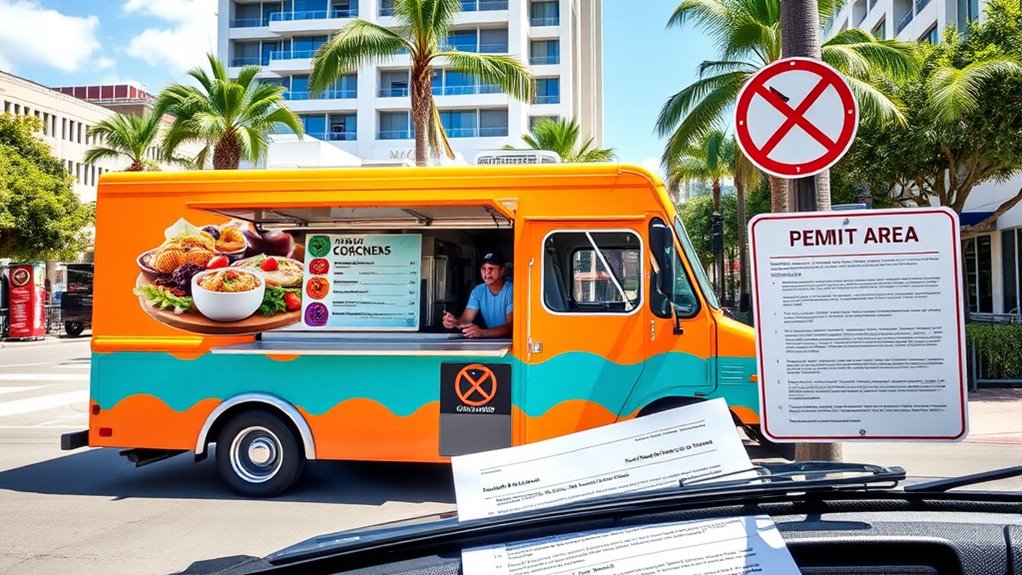
Understanding where you can legally operate your food truck starts with familiarizing yourself with local zoning regulations and permitted locations. Food trucks are mainly allowed in districts that permit eating and drinking, such as MU-, AC-, and IC zones. Suitable sites include private off-street properties, schools, religious institutions, malls, town centers, and main street districts. However, areas like Downtown Orlando, Semoran Boulevard, and International Drive often prohibit mobile vending, except for certain exceptions. You must maintain a minimum 5-foot setback from rights-of-way and 50 feet from residential zones. Operating on improved surfaces and limiting to one truck per property are required. To be legal, you’ll need Business Tax Receipts from Orlando and Orange County, plus planning approval if you plan permanent placement.
Crafting a Food Menu That Meets Regulations
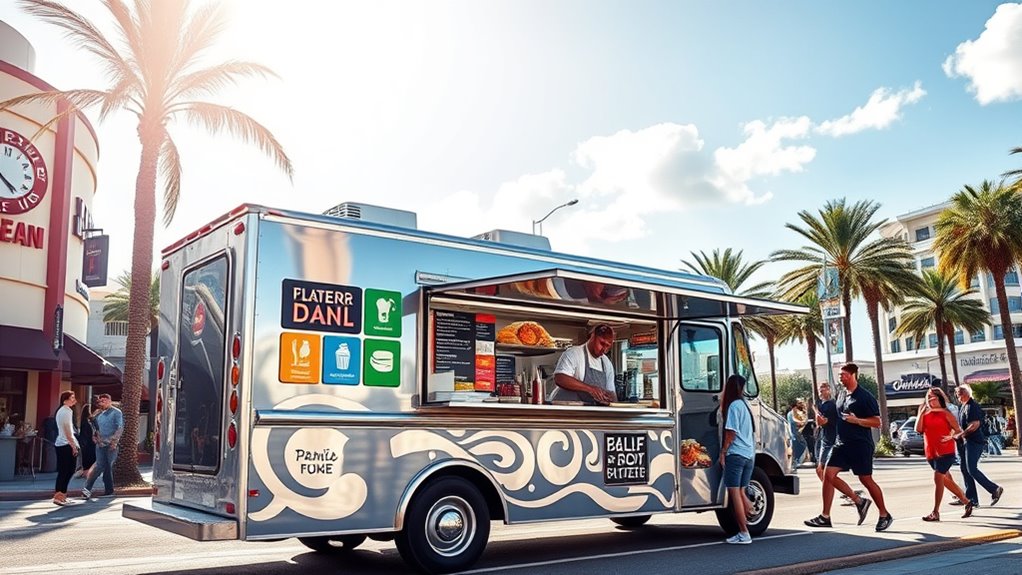
Creating a compliant food menu for your Orlando food truck requires careful attention to local and state regulations governing food safety, permitted items, and preparation methods. You must obtain a food service license from the Florida Department of Business and Professional Regulation, including plan review and inspections. Your menu should avoid prohibited or insufficiently regulated items—stick to prepackaged, non-potentially hazardous foods, or fully cooked meals with proper permits. Onsite cooking is allowed only with the correct equipment and safety permits, influencing your menu choices like grilling or frying. Keep food temperatures safe with proper refrigeration and hot-holding. Simplify your menu to a few items to ensure efficiency, safety, and compliance, while maintaining clear ingredient labels and sourcing from approved suppliers. Understanding the regulations is essential to ensure your menu aligns with recent changes in Orlando’s mobile vending policies and avoids potential violations. Additionally, staying informed about food safety standards can help you implement best practices and prevent health violations.
Developing Effective Marketing and Operational Strategies

Developing effective marketing and operational strategies is key to making your Orlando food truck stand out and run smoothly. Focus on targeting Millennials and Gen Z by creating memorable branding with bold logos, unique truck designs, and eye-catching wraps that serve as mobile billboards. Emphasize local, eco-friendly practices in your marketing and menu to appeal to their values. Food truck parks offer a strategic location to increase visibility and attract regular customers, making them an essential part of your marketing plan. To maximize visibility, consider:
Create bold branding and eco-friendly menus to attract Millennials and Gen Z to your Orlando food truck.
- Participating in local food festivals, farmers’ markets, and community events
- Partnering with nearby businesses like breweries or coffee shops for cross-promotions
- Distributing branded merchandise such as shirts, hats, or stickers
- Attending popular food truck parks regularly to attract repeat customers
- Incorporating grocery savings strategies such as purchasing seasonal produce to keep your menu fresh and cost-effective, which can appeal to budget-conscious customers
Combine online efforts like social media with offline outreach for an extensive approach that builds brand loyalty and boosts sales.
Frequently Asked Questions
How Long Does It Typically Take to Obtain All Necessary Food Truck Permits in Orlando?
You’re wondering how long it takes to get all the permits. Typically, the process spans about 4 to 8 weeks. It starts with submitting complete applications, which can take 1-2 weeks, followed by health inspections, commissary approvals, and business registrations, each taking another 1-2 weeks. Delays can happen if paperwork is incomplete or if inspections take longer. Early prep helps you get approved faster.
Are There Specific Insurance Requirements Mandated by Orlando for Food Truck Operators?
Your question about Orlando’s insurance rules is essential because failing to meet them could cause chaos! State law mandates minimum liability coverage of $10,000 for property damage and PIP. If you have employees, workers’ comp is required. You’ll also need commercial auto and general liability insurance, often with higher limits for better protection. Local rules may demand additional coverage, so always verify with Orlando authorities to stay compliant and avoid headaches.
Can I Operate a Food Truck on Residential Properties in Orlando?
You can’t operate a food truck on residential properties in Orlando unless it’s for limited special events, like a few times per year at schools or religious institutions. Generally, zoning laws prohibit operating on residential zones, and you need property owner permission, plus approval from the city. Operating outside these rules risks penalties, so it’s best to stick to commercial zones or approved event sites to stay compliant.
What Are the Penalties for Operating Without Proper Permits in Orlando?
Operating without proper permits in Orlando is like sailing into stormy waters without a map—you risk hefty fines up to $1,000 per violation, license suspensions, and even criminal charges. City authorities enforce strict rules, and defying them can lead to business shutdowns, seized equipment, or legal trouble. Without permits, you’re playing a dangerous game that could wipe out your investment and damage your reputation beyond repair.
Are There Any Grants or Financial Assistance Programs Available for New Food Truck Businesses?
You’re wondering if any grants or financial assistance programs support new food truck businesses. In Orlando, several options exist, like the City of Orlando’s Business Assistance Program offering up to $20,000 for permits and improvements, and grants from Orange County for small businesses. Additionally, women-owned businesses can access specific grants like BMO’s Celebrating Women Grant. These programs typically require a solid business plan and proper licensing to qualify.
Conclusion
Starting your food truck in Orlando can be rewarding with the right permits, location choices, and marketing. For example, imagine launching a taco truck near downtown, leveraging local events to attract customers and staying compliant with zoning laws. By carefully planning your menu and promotional strategies, you’ll build a loyal following and stand out in Orlando’s vibrant food scene. With dedication and smart decisions, your food truck can become a thriving business in this bustling city.

